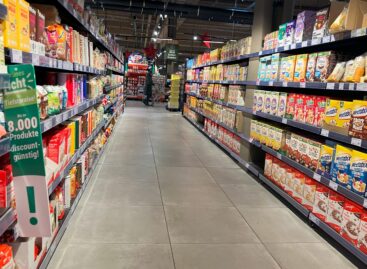Retail players also recommend the closure of the price cap
The first food price stop came into effect one year ago, on February 1, 2022. According to the leading actors of the sector, in the upset market environment of the European Union, the introduction of price caps would help preserve the competitiveness of the domestic agriculture and food industry, stabilizing our country’s food self-sufficiency. This is in the common interest of producers, food processors and traders.

Agriculture is Hungary’s strategic sector, domestic food production is extremely important, which was also proven during the coronavirus epidemic. In the current unbalanced European Union market, it is particularly important that domestic suppliers maintain their positions and competitiveness. It is known that the price cap is not a market, but a social measure, but unfortunately, in the recent period, an unfavorable process contrary to the interests of the domestic sector has started in the field of food trade. On the one hand, imports are increasing in several segments at the expense of domestic producers, and on the other hand, the cooperation and relationship of trust built up in previous years between traders and domestic suppliers is weakening.
During the one-year period of the price cap, traders provided families with a significant discount based on the relevant legislation. At the same time, the introduction of price caps in retail trade would also remove an obstacle – as it now means significant losses for traders, which ripples through the entire sector – to be able to provide promotions and price discounts on a wider scale (similar to the period before the price cap). With the introduction of the price cap, the market distortion processes causing adverse effects would cease, the termination of which could also be favorable for consumers.
It is in the interest of every Hungarian customer that their exposure to imports does not increase, as it also threatens domestic food self-sufficiency. Official price regulation is favorable for consumers in the short term, but in the long term it generates a shortage of goods, distorts the market and threatens the sustainable and predictable operation of domestic product lines.
Related news
Price caps are back on the agenda: What could this mean for customers and stores?
🎧 Hallgasd a cikket: Lejátszás Szünet Folytatás Leállítás Nyelv: Auto…
Read more >Related news
The Hungarian Food Book is 50 years old
🎧 Hallgasd a cikket: Lejátszás Szünet Folytatás Leállítás Nyelv: Auto…
Read more >ZEW: Economic expectations worsened in Germany and the euro area in February
🎧 Hallgasd a cikket: Lejátszás Szünet Folytatás Leállítás Nyelv: Auto…
Read more >NKFH: inspections focus on discount prices and customer deception
🎧 Hallgasd a cikket: Lejátszás Szünet Folytatás Leállítás Nyelv: Auto…
Read more >








